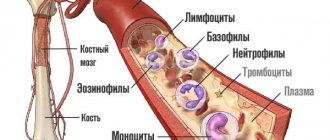The pace of modern life especially threatens the well-being of women. They constantly experience overload: at work, at home, in their personal lives, in communication with family and friends. Women experience troubles painfully, suffer from physical overload, as they take on much more than their nervous system and physical endurance can handle. As a result, the body reacts with stress, in which the hormone cortisol is released into the blood in large quantities.
A woman’s body can survive a one-time or slightly increased release of cortisol, but too strong nervous and physical shocks, as well as a state of constant stress over a long period, lead to very serious consequences for women’s health and even life.
The importance of cortisol for the female body
One of the most important endocrine organs in humans is the adrenal glands. They are located on the upper poles of both kidneys. The functioning of this organ determines how adequately a person reacts to stressful situations and how quickly he can adapt in unfavorable conditions.
In the zona fasciculata of the adrenal cortex, glucocorticoids are formed - hormones that suppress allergic and immune reactions, reducing the level of inflammation in the body. One of them is cortisol.
Cortisol is the most important participant in carbohydrate metabolism in the body. Its main function is considered to be the conservation of energy even in sudden stressful situations.
The hormone stimulates the breakdown of glucose in order to store glycogen in the human liver. It is these energy resources that are consumed during times of increased danger.
Functions of cortisol:
- Preservation of glucose in muscles while activating its breakdown in other organs. This function will allow you to activate your muscles as much as possible when it is necessary to react physically to circumstances: fight in self-defense or quickly leave a dangerous place or run away.
- Normalizing blood pressure with an increased heart rate is another protective function of the hormone. This will minimize the likelihood of a heart attack during times of stress.
- Thoughts become clearer and brain function is activated. The action of the hormone promotes maximum mental concentration on the problem that has arisen.
- Cortisol normalizes the functioning of the liver, is a natural hypoallergenic and anti-inflammatory substance that reduces the body's immune response to external irritants.
- As the baby develops in the womb, cortisol is involved in the formation of the baby's lungs.
The role of the hormone
The main role of this substance is to help the body during stress .
When a person is in a shock situation, this hormone supports the nervous system and stimulates the heart.
If cortisol is normal , inflammatory processes and allergic reactions are successfully suppressed, carbohydrate and fat metabolism are regulated.
As soon as a person finds himself in unfavorable conditions, the stress hormone immediately comes into play.
The least important functions are deactivated, and all energy is directed to instantly solving the current problem.
With short-term stress, the substance promotes the following changes in the body:
- increased metabolism;
- increased concentration;
- decreased activity of the digestive system;
- increased heart rate;
- increased blood pressure;
- expansion of bronchioles;
- an increase in the concentration of glucose in the blood due to increased synthesis of glycogen reserves by the liver.
During fasting, this hormone provides the body with energy, but does this mainly through muscle tissue.
It prevents bodybuilders from building muscle mass because it actively uses proteins, breaking them down into amino acids. And with excessive loads, especially in high-performance sports, it accumulates, leading to a feeling of muscle weakness and fatigue.
If an athlete pumps up muscles, he has to constantly monitor his cortisol levels, otherwise all his efforts will go down the drain.
The concentration of the hormone in the blood is determined only in the laboratory: blood from a vein is donated in the first half of the day on an empty stomach.
They begin to prepare for the analysis three days in advance - during this time they do not engage in intense sports, do not smoke or drink alcohol-containing drinks.
Do not use hormonal agents or pharmaceuticals, which should be warned by the doctor who prescribes the referral for testing.
Salt will have to be reduced to 2 g per day.
For a woman of childbearing age, the normal concentration is:
- in the morning 170-536 nmol/ml;
- in the evening 65-327 nmol/ml.
If you want to know why white blood cells are elevated in a woman’s blood, read our article.
This publication will tell you what hemoglobin is considered normal in women.
How to correctly pass a general urine test for a woman? Read in this material.
Causes of increased cortisol levels
Cortisol is increased in women (the reasons for this phenomenon lie in stress, since the secretion of the adrenal cortex is a stress hormone) immediately when an unforeseen situation arises.
In a split second, special secretions are formed in the brain (first in the hypothalamus, and then in response in the pituitary gland), provoking the release of cortisol by the adrenal glands. Receptors that respond to the presence of cortisol are found in all human organs and tissues.
For the body, a stressful situation can become:
- lack of food, including during diets;
- circumstances causing fear;
- increased physical activity, especially longer than 60 minutes;
- anxiety and excitement on the eve of sports competitions or before exams;
- difficult situations and troubles associated with work;
- inflammation;
- all types of injuries;
- pregnancy, during which cortisol levels can increase 2-5 times.
A constant elevated amount of cortisol in the blood indicates the presence of chronic inflammatory processes, permanent stress in a person’s life, as well as possible hormonal imbalances.
When analyzing the state of the body, it is necessary to make adjustments for the woman’s increased emotionality. In addition, increased rates can be obtained with serious diseases such as liver cirrhosis or severe renal pathology. The intake of estrogens, female sex hormones, has a significant effect on the level of cortisol in the blood.
Cortisol is elevated in women (reasons given) may be due to:
- taking hormonal contraceptives;
- polycystic ovary syndrome - a disease characterized by a large number of cystic formations;
- alcohol and drug abuse, smoking;
- depression.
Signs and symptoms
In the following cases, there is every reason to get tested for total hydrocortisol:
- There are signs of too early puberty in a teenager.
- Reduced bone density due to osteoporosis.
- Thinning muscle mass and causeless weight loss.
- Pronounced manifestation of acne in adulthood.
- Significant impairment of skin pigmentation.
- A depressed state caused by a decrease in the activity of happiness hormones (serotonin and dopamine) under the influence of high doses of cortisol.
- Wounds that do not heal for a long time.
For women, characteristic signs of increased secretion of the stress hormone are:
- excessive body hair (hirsutism);
- irregular monthly cycle;
- untreatable thrush;
- constant desire to eat something sweet and fatty.
If you do nothing
If this condition remains untreated for a long time, the woman runs the risk of encountering the following complications:
- Atherosclerotic changes in blood vessels.
- Infertility.
- Inhibition of the body's defenses.
- Arterial hypertension.
- Obesity.
- Decrease in muscle tissue volume.
- Ischemic stroke.
- Diabetes.
- Myocardial infarction and coronary heart disease.
How to Check Your Cortisol Levels
To determine the concentration of stress hormone in the blood, you can take the following types of tests:
- urine collected per day is intended for the study of free cortisol;
- blood from a vein – will allow timely identification of systemic pathologies in the endocrine and hormonal systems;
- saliva – contains free molecules of the stress hormone.
Stress Relief Techniques
Thanks to certain techniques, a woman is able to get rid of stress, put her thoughts in order, and switch to the positive. Doctors prescribe patients regular exercise in the following sports:
- Swimming;
- Horse riding;
- Biking;
- Dancing;
- Yoga.
To get pleasant emotions, you don’t have to become an athlete, because you can find something you like. Meetings with friends, pleasant company, shopping, traveling have a beneficial effect on health and contribute to hormonal adjustment.
How to take a cortisol test correctly
Women donate blood from a vein regardless of menstruation; the test is taken on an empty stomach in the morning (no later than 10 o’clock). On the eve of blood donation, alcohol consumption is excluded, and severe physical or emotional stress is unacceptable.
In some cases, it is possible to measure cortisol levels using a urine test, which examines all urine collected over a 24-hour period.
Before submitting urine for cortisol testing, you must prepare as follows:
- At least 2 days before collection, you must stop taking hormonal and diuretic drugs.
- On the day of the test, smoking and excessive physical activity are excluded, and the possibility of stressful situations is minimized.
- All urine is collected in a clean container, which is stored in the refrigerator.
- The last portion of urine is collected at the same time as the first.
To more accurately identify daily fluctuations in the hormone, saliva analysis is performed. The material is collected at 8 a.m. on an empty stomach, the second collection occurs between 11 p.m. and 12 a.m. Before taking the test at night, you must refuse to eat for at least 4 hours. The day before saliva collection, you should not brush your teeth.
Which doctor to contact, diagnosis
If you suspect an imbalance of cortisol in the body, for example, if you feel constant fatigue, you need to consult an endocrinologist , who will make his own judgment about the problem and give a referral for tests.
First, we will have to consider a malfunction in the “pituitary gland – hypothalamus – adrenal glands” system.
Identifying the true cause of the pathology is difficult.
Because in addition to system failures, an increase in hormonal levels can be caused by diseases for which distortion of hormone synthesis is a secondary symptom.
These include obesity, alcoholism, diabetes and other diseases.
If several blood samples are taken in one day at intervals of several hours, this will allow us to assess the daily rhythm of hormone fluctuations.
Even if the morning level falls within the normal range, in the evening it may turn out that the concentration does not decrease.
If necessary, the analysis can be repeated after a few days to avoid the influence of extraneous factors on the result - any little thing can greatly change the “chemistry” of the body.
If Itsenko-Cushing's disease is suspected, not only blood, but also urine is given for a detailed analysis.
Cortisol norm.
Cortisol is increased in women (the reasons for this fact may be physiological) in the early morning hours from 6.00 to 8.00 am. During this period, the cortisol level is 2-5 times higher than the evening level.
Under normal circumstances, the concentration of the hormone gradually decreases throughout the day. At midnight, the lowest concentration of this hormone in the blood is observed. Sleeping during the day causes a temporary increase in the concentration of the substance immediately after waking up.
The normal amount of cortisol in the blood of women, depending on the time of day:
| Times of Day | Cortisol, mcg/dl | Cortisol, nmol/l |
| From morning to noon | 6,2 – 19,4 | 101,2 – 535,7 |
| After 5 pm | 2,3 – 11,9 | 79,0 – 477,8 |
The range of normal levels of cortisol in the blood has a fairly wide range and varies depending on the age and individual characteristics of the person.
Blood cortisol levels:
| Age | Lower permissible value, nmol/l | Upper limit value, nmol/l |
| under 1 year | 28 | 966 |
| 1 year – 5 years | 28 | 718 |
| 6 – 10 years | 28 | 1049 |
| 10 – 13 years | 55 | 690 |
| 14 – 16 years old | 28 | 856 |
| over 16 years old | 138 | 635 |
A normal level of cortisol in urine will be between 28.5 and 213.7 mcg per day. The upper permissible value of the indicator in morning saliva is 19.1 nmol/l; for evening analysis, the maximum permissible cortisol level is 9.4 nmol/l.
How to treat: treatment methods
Even if laboratory tests reveal an increase in cortisol , they will not indicate the cause of the pathology.
Additional research will have to be conducted, because there are no universal drugs that reduce cortisol levels.
Each case is considered individually and, depending on the reasons that caused it, methods are developed and applied.
If the cause of increased hormone secretion is a disease, the problem must be solved, starting with getting rid of the disease.
Since the main cause of excessive and constant increase in cortisol levels in the body is stress, the first thing you need to learn is to increase your stress tolerance.
Without this, all other measures will not be effective. There are many ways to deal with stress, so finding one that helps you effectively withstand the pressures of circumstances will not be difficult.
First you should try the following simple methods:
- Meditation. Relaxation with this technique helps improve well-being, improve mood, calm thoughts and have a positive effect on the brain, which regulates hormone production.
- Moderate and regular physical activity. Just 30 minutes a day of swimming, jumping rope, cycling, walking at a fast pace, and dancing will significantly increase the body's resistance to stress.
- Friendly meetings with like-minded people. Regular pleasant communication helps maintain positive thoughts and curb the stress hormone.
- Balanced diet. A healthy diet that saturates the body with essential substances contributes to its full functioning.
- Healthy sleep. You are supposed to sleep at least 7 hours, and do not stay up past midnight, but go to bed before 12 o’clock at night.
- Some vitamins and microelements help reduce cortisol levels. Vitamin C, taken three times a day with meals, has a positive effect on stabilizing hormonal levels in general and on cortisol levels.
During stress, there is a significant loss of magnesium from cells, so it is recommended to consume this trace element in the form of magnesium chloride, citrate or gluconate.
- Extracts of Rhodiola rosea, Ginkgo biloba, St. John's wort and Eleutherococcus, omega-3 fatty acids, licorice root tea, and lecithin help reduce cortisol levels.
This publication will tell you what nutrition should be like for high hemoglobin in women.
The causes of dizziness with normal blood pressure in women are discussed in this material.
You can learn about how to test for ureaplasma in women from our article.
Consequences of elevated cortisol
Elevated cortisol levels in women can cause pathological consequences. One of the most important characteristics of this hormone is its long-lasting effect. After the end of a stressful situation, the level of the hormone in the blood continues to be elevated for some time.
Elevated cortisol levels in women and men cause stress, which in turn causes damage to the brain
In sensitive people, a series of problematic situations leads to a chronic increase in cortisol in the blood , as a result of which the pulse constantly increases, the brain works in a stressful mode, the body wears out and ages. To replenish glycogen reserves, even glucose from protein muscle mass is processed.
As a result of such a long process, cortisol obesity can occur, the symptoms of which are:
- Thin legs;
- thinned muscles;
- accumulations of fat mainly on the abdomen and chest.
General information
Cortisol belongs to the group of steroids, produced by the adrenal cortex. Among the glucocorticoid hormones, it is the most active. The substance is involved in the regulation of metabolic processes, when additional sources of energy are needed in a stressful situation .
With chronic stress, cortisol resistance occurs; the hormone is no longer perceived by the body as needed for mobilization and problem solving. All the sugar and proteins that a person consumes is stored in fat, the condition worsens, and insulin resistance is provoked.
For the active functioning of the nervous and circulatory system, cortisol quickly converts complex organic substances into simple ones, thereby releasing additional energy. Once in the blood, the hormone increases glucose levels, thereby maintaining active brain function. The action of glucocorticoid is aimed at suppressing inflammatory processes and allergies. All the forces of the body are mobilized to quickly solve the problem that has arisen .
Elevated cortisol levels affect physiological systems in different ways. The activity of some accelerates, while that of others slows down. In other words, less important processes are deactivated . The body’s functioning under the influence of active glucocorticoid in a stressful situation is as follows:
- activation of metabolism;
- increased concentration;
- high brain activity;
- increased heart rate;
- increased blood pressure;
- expansion of the respiratory tract;
- increased blood glucose levels;
- decreased activity of the digestive organs.
Cortisol and pregnancy
The transition to an “emergency” mode of high alert in the body can occur not only under the influence of stress, but also with thoughts or memories of it. In this case, not only does the heart rate increase and breathing accelerates, but such important processes as digestion and restoration of the body are temporarily suspended.
The level of stress hormone in the body of a pregnant woman begins to increase, starting from the second trimester. In the last 2-3 weeks of pregnancy, the concentration of cortisol secretion in the blood is comparable to its level in people suffering from melancholic depression or Cushing's disease.
Thus, the hormone level in an adult non-pregnant woman ranges from 0 to 25 mcg/dl. In the first trimester, the acceptable level of the substance ranges from 7 to 19 mcg/dl, the second trimester is characterized by a range of 10-42 mcg/dl, and the third - from 12 to 50 mcg/dl.
An increase in cortisol at the very beginning of pregnancy is caused by the need to protect the growing fetus from the mother's immunity , to suppress her immune response to the new organism taking hold in the uterus. An increase in the concentration of secretions in a woman’s blood towards the end of pregnancy makes her more stress-resistant.
Thus, during the experiments it was found that when pregnant women immersed their hands in ice water in their final stages, there was no surge in the stress hormone; it remained at the same (constantly elevated) level.
What is dangerous, possible consequences
If the body is under stress for a long time (this happens especially often in women), high concentrations of the stress hormone in the blood become a chronic phenomenon.
This begins to gradually undermine your health:
- a constant increase in pressure makes the body more vulnerable and the risk of heart and vascular disease increases;
- increased stimulation of glucose synthesis leads to a constant increase in its level in the blood;
- suppression of insulin production further increases blood glucose levels;
- increased risk of osteoporosis due to suppressed bone formation and impaired calcium absorption;
- weakened immunity, as T-lymphocytes form and function less well;
- electrolyte imbalance – sodium is retained in the body, and water and potassium are excreted intensively.
- accelerating weight gain.
In addition to the direct harmful effects, cortisol above normal levels in women also has an indirect effect :
- digestive problems;
- increased cholesterol levels;
- memory impairment;
- disorders in the reproductive system;
- slower recovery from injuries;
- deterioration in the production of thyroid hormones.
Drug treatment for high cortisol
Based on the results of the examination, the endocrinologist can diagnose “hypercortisolism,” which is characterized by excessive production of hormones by the adrenal glands.
https://www.youtube.com/watch?v=56U1xUnnimQ
In acute cases, hormonal therapy may be prescribed, which is prepared by a doctor, based on the reasons for the increase in stress hormone. Hormonal drugs are potent drugs that have many side effects, and therefore are prescribed only in extreme cases in very limited doses.
Some non-hormonal drugs have the function of blocking cortisol:
- Clenbuterol – refers to effective medications against asthma, at the same time it can block the stress hormone.
- Hydroxymethylbutyrate - refers to leucine derivatives (muscle growth activators).
- Cortidren.
Abuse of blockers without prior consultation with a doctor can lead to hormonal imbalance in the body, which will be the impetus for the development of many concomitant diseases.
Diet
When elevated levels of cortisol are detected in the body, it is recommended to change dietary habits, which can significantly smooth out cortisol surges:
- Sufficient protein content in the diet will save the body from loss of muscle mass due to increased stress hormones. Eggs, fish, poultry, meat should become a basic component of the diet, while foods with a high glycemic index (sugar-containing foods, white flour) should be completely excluded.
- Excessive cortisol production is often a normal reaction of the body to too many eicosanoids, derivatives of omega-6 fatty acids. The dietary balance should be adjusted towards increasing omega-3 fats by including fatty wild fish in the menu and significantly reducing the amount of omega-6 consumed in the form of vegetable oil and animal fats.
- Vitamin C is a natural antioxidant and antidepressant; its regular use, even in the form of ascorbic acid, reduces the secretion of cortisol. The diet should include a large amount of fresh vegetables and fruits, as well as rosehip tea.
- Caffeine and energy drinks lead to constant releases of cortisol, so you should reduce the amount of them in your diet as much as possible.
- Dehydration, which can occur unnoticed if there is no clean water in the diet, leads to an increase in the concentration of the stress hormone. The optimal amount of water per day is 8 glasses. Tea and coffee have a diuretic effect, cereals and dried fruits take up a lot of fluid, swelling in the intestines, and therefore additional water intake is physically necessary for the body.
- To normalize hormonal levels, you should eat regularly, without skipping meals. Hunger leads to the release of cortisol.
Features of the mode
Cortisol is elevated in women (the reasons for this circumstance are significant physical and emotional stress), who do not have the opportunity to fully rest.
To normalize the functioning of the adrenal cortex, you should adhere to the following rules:
- Ensure normal sleep lasting 7-8 hours, preferably falling asleep before 23.00.
- Take an hourly break from heavy physical or mental work and a short rest relieves stress.
- Learn to relax. At least 3 times a week for 30 minutes must be spent in an absolutely calm state, abstracting from problems. This could be meditation, taking a bath, prayer.
- Laughter and fun give the body emotional release, pleasant communication in a relaxed atmosphere, and watching a funny movie are useful.
- Calm physical activity that does not increase your heart rate suppresses cortisol. These include Pilates, yoga, and walking in the fresh air.
- Pleasant sounds and favorite music promote relaxation.
Lab tests
A referral for a blood (urine) test to determine cortisol levels is prescribed in the presence of the following health problems:
- hypertension;
- suspicion of ACTH (osteoporosis, progressive tumor);
- sudden weight loss/gain;
- physical weakness, fatigue;
- thinning of the skin, formation of stretch marks;
- in the treatment of adrenal glands.
Women should be tested for cortisol if they experience symptoms such as excessive hair growth on the body and face, recurrent thrush, or problems with the menstrual cycle. Children are sent for analysis if they experience premature puberty (regardless of gender).
Cortisol levels are checked in acute depressive states. Usually with this course of the disease it increases greatly.
Other indications for laboratory testing include:
- slow wound healing;
- increased/decreased glucose levels;
- the appearance of swelling and bruising;
- deficiency or excess of potassium in plasma;
- decreased blood pressure, etc.
The hormone is determined by biochemical and general blood tests. Additionally, urine is examined (general analysis), and if necessary, saliva is also taken from the patient.
A trip to the laboratory should be planned in the morning. This is approximately from 7-00 to 10-00. You should refuse to eat before taking blood. One day before donating blood and urine, physical and emotional stress should be avoided. This way you can get a reliable result. When preparing for the procedure, you need to give up alcohol and tobacco. Half an hour before the test, the patient should be in absolute peace.
To obtain adequate information about the level of cortisol and changes in its concentration, repeated samples of biomaterial should be taken. If necessary, additional studies are offered:
- if Cushing's syndrome is suspected, morning and evening tests are taken;
- Dexamethasone stress tests are prescribed (for 1-2 days the patient takes hormonal drugs that reduce the production of cortisol);
- To determine free cortisol, urine collected per day (100-120 ml) is taken.
The hormone level is determined primarily by the CLIA (automated chemiluminescent immunoassay) method. The result is accurate and fast. The research data is known the very next day. The cost of the procedure is 700-900 rubles. With express processing of biomaterial (in 2-3 hours), the price increases to 1200-1400 rubles.
Traditional medicine recipes
Licorice root should be taken in the form of a water infusion of 1 tbsp. from 3 to 5 times a day. To prepare the product, you need to pour 10-15 g of raw material with boiling water in a volume of 200 ml and leave for 20 minutes. The infusion is filtered. Licorice contains an enzyme that blocks cortisol.
Alcohol tincture of Rhodiola rosea (aka red brush) is taken 2-3 times a day, 10-15 drops. The dietary supplement is taken a quarter of an hour before meals. The minimum course is 10 days. The plant has general strengthening properties and suppresses the secretion of cortisol.
What not to do if you have high cortisol
If you have problems falling asleep and waking up, you should not resort to alcohol and coffee - the situation will only worsen.
Any stress during this period is dangerous to health, you should avoid it as much as possible and try to calm down quickly. You should not engage in strenuous exercise for more than 45 minutes. When you exceed the recommended duration of training, the body begins to produce additional doses of cortisol.
The balance of the hormonal state in women is the key to good health, preservation of youth and excellent memory. The cause of disturbances in the body can be increased cortisol. It is important to learn how to cope with stress and lead a healthy lifestyle, striving for a positive attitude.
Author: Elena Zhukova.
Article design: Mila Friedan











